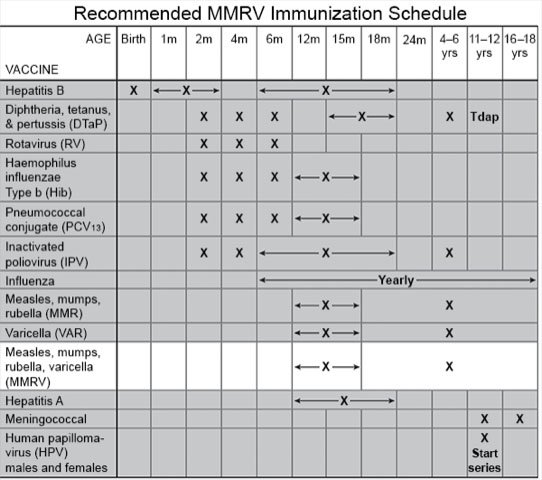Mmrv Vaccine for Children
Medically reviewed by Drugs.com. Last updated on Apr 6, 2025.
What do I need to know about the MMRV vaccine?
The MMRV vaccine is an injection given to help prevent measles, mumps, rubella, and varicella (chickenpox). These diseases are caused by viruses that spread easily from person to person. The MMRV vaccine is given to children 12 months to 12 years of age. It may be given with other vaccines, if they are not live vaccines.
When should my child get the MMRV vaccine?
Your child should receive 2 doses:
- The first dose is given at 12 to 15 months.
- The second dose is usually given at 4 to 6 years. The second dose may be given 3 months after the first dose, if necessary.
 |
What are reasons my child should not get the MMRV vaccine?
- Your child had an allergic reaction to gelatin or neomycin.
- Your child had an allergic reaction to any measles, mumps, rubella, or varicella vaccine.
- Your child has a blood or bone marrow disorder, such as leukemia or lymphoma.
- Your child currently uses a medicine that weakens the immune system, such as steroids.
What are reasons my child should wait to get the MMRV vaccine?
Your child may need to wait to get MMRV, or instead get separate measles, mumps, rubella, and varicella vaccines. Tell the provider if:
- Your child is sick or has a fever.
- Your child received other live vaccines within the past 4 weeks.
- Your child has any life-threatening allergies.
- Your child takes antiviral medicine, such as acyclovir or valacyclovir.
- Your child has a disease or a family history of a disease that weakens the immune system.
- Your child has a history of seizures, or a parent or sibling who has a history of seizures.
- Your child has a condition that causes him or her to bleed easily.
- Your child currently uses or soon plans to use a salicylate medicine, such as aspirin.
- Your child had a blood transfusion in the last 3 to 11 months.
- Your child is or may be pregnant.
Drugs used to treat this and similar conditions
GamaSTAN S/D
GamaSTAN S/D is used for hepatitis a, measles, rubella, varicella-zoster
Immune globulin intramuscular
Immune globulin intramuscular systemic is used for hepatitis a, measles, rubella, varicella-zoster
What are the risks of the MMRV vaccine?
Your child's joints may become painful and swollen. Your child may develop a fever, mild rash, or swollen neck or cheek glands. Your child may have an allergic reaction to the vaccine. The vaccine may cause pneumonia or swelling of the brain and spinal cord. It may also cause a low platelet count, which can lead to life-threatening internal bleeding. Your child may have a seizure, usually from a fever. This is more likely if your child gets MMRV as the first dose in the series.
What safety precautions are needed after a varicella vaccine?
- Do not give aspirin for 6 weeks after a dose of MMRV or separate varicella vaccine. Aspirin and other salicylate medicines increase the risk for a serious condition called Reye syndrome after a varicella vaccine.
- If your child develops a rash, do not let him or her near anyone who is not protected against varicella. A rash is a sign that the varicella virus can spread. Your child's provider can tell you when your child will no longer be contagious. This is usually after the rash goes away.
Call your local emergency number (911 in the US) if:
- Your child's mouth and throat are swollen.
- Your child is wheezing or has trouble breathing.
- Your child has chest pain or his or her heart is beating faster than usual.
- Your child feels like he or she is going to faint.
- Your child has a seizure.
When should I seek immediate care?
- Your child's face is red or swollen.
- Your child has hives that spread over his or her body.
When should I call my child's doctor?
- Your child feels weak or dizzy.
- Your child has a fever or chills.
- Your child has swollen lymph glands in his or her cheeks or neck.
- Your child's joints are painful and swollen.
- Your child has increased pain, redness, or swelling around the area where the shot was given.
- You have questions or concerns about your child's condition or the MMRV vaccine.
Care Agreement
You have the right to help plan your child's care. Learn about your child's health condition and how it may be treated. Discuss treatment options with your child's healthcare providers to decide what care you want for your child. The above information is an educational aid only. It is not intended as medical advice for individual conditions or treatments. Talk to your doctor, nurse or pharmacist before following any medical regimen to see if it is safe and effective for you.© Copyright Merative 2025 Information is for End User's use only and may not be sold, redistributed or otherwise used for commercial purposes.
Further information
Always consult your healthcare provider to ensure the information displayed on this page applies to your personal circumstances.
